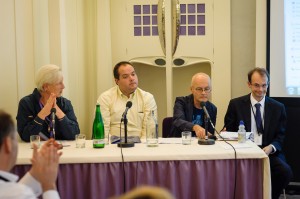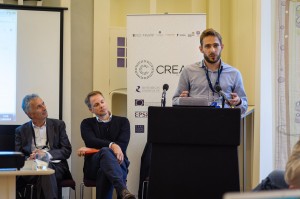
From left: Ruth Towse, Kenny Barr, Keith Negus and Daniel Zizzo
University of Nottingham PhD candidate Liz Dowthwaite reports on CREATe Results: Music session at the September CREATe All Hands Conference.
The music session consisted of four reports highlighting ongoing projects within CREATe. The speakers were Daniel Zizzo from Newcastle University, Keith Negus from Goldsmiths College London, Kenny Barr from the University of Glasgow, and Ruth Towse of Bournemouth University and University of Glasgow. Georg von Graevenitz from Queen Mary University of London and Scott McMaster, drummer for the band Kid Canaveral and an employee of University of Glasgow, offered external responses. John Street from University of East Anglia chaired the session.
Daniel Zizzo spoke about the determinants of unlawful file sharing. A scoping review looking at a range of different sources has been carried out, identifying financial, legal, and moral factors, and social norms, to create a theoretical framework. Most studies focus on music or movies, but there is little concerning observed behaviour, moral utility or social utility. Zizzo pointed out that the relationship between sales and unlawful file sharing is complex; it can be problematic because it may take away from artists’ income, or it may actually generate sales by promoting interest or fostering new business models. Big music labels may take a financial hit, but the volume of music being created and distributed is actually increasing. Zizzo also discussed some very preliminary findings of the survey which followed this review, stating that some interesting results are emerging, and connections with previous studies have been identified. Overall this is a huge area of study, with lots of gaps that CREATe will address in current and upcoming projects.
Keith Negus discussed musicians’ practices, beliefs, and negotiations with regards to copying, particularly as part of the creation process. Copying is generally seen with negativity, implying lack of originality and authenticity, exploitation, and depriving people of both income and recognition. During research with musicians Negus and colleagues have found that there is in fact a more nuanced typology of copying, where it can also have a positive value and creative importance. They highlight three types of musical copying: imitation, transformation, and plagiarism. The institutional view, with pop music and song writing courses generally focussing on originality, is often incompatible with beliefs and values outside the establishment, where there is more emphasis on learning by copying; many of the greats, notably the Beatles and Bob Dylan worked this way, and it is still apparent today, for example in You Tube videos. Overall, this fascinating project questions existing assumptions about copying and originality.
Kenny Barr reported on his PhD which focusses on copyright, creators, and commercial decision making. He emphasised working within the digital realm as it exists now rather than studying the changes which occurred during the digital revolution. Through an analysis of documents about copyright transactions including collecting societies, royalty statements, and so on, Barr has examined the potential financial value of copyright transactions. He has also carried out a series of interviews with composer-performers, and with employees or owners of music publishers. These are the two main actors facing decisions about how to exploit the rights surrounding a musical work. Covering as great a range of copyright experience as possible, as well as many types of publisher, Barr is emerging with an illustration of what is important in the multi-faceted, multi-layered interplay between the two actors. Tentative observations also seem to suggest that creators become copyright aware through practice rather than teaching.
Finally Ruth Towse took us on an historical journey through the changes in musical copyright and business models. Using data from Spain, Italy, and Britain, the project tracks the effect of changes in copyright and in the production and consumption of music on business models. Historically, the Church, and opera companies, financed a lot of music so there was little need to print, but this changed with the advent of home use and public concerts (which were not allowed in the UK until the 1850s). Nowadays, broadcasting and on-demand streaming are also added into the mix. Towse also discussed the international nature of the music industry, and how this affects publishing models. She pointed out that music piracy is actually the most basic and persistent of business models throughout history. Printed music was sold by peddlars on the streets, and the diversity of supply was impossible to control, until retails models were developed. Copyright in music took a long time to establish, and it has changed a lot over time. The project also looks at how rights are exploited by music publishers; the effects of digitisation on this area have not yet been fully explored.

Kid Canaveral Drummer and University of Glasgow Lawyer Scott McMaster responds to the panel, watched by Chair John Street of University of East Anglia and Georg von Graevenitz from Queen Mary University of London
In response, Graevenitz pointed out that the talks had been very copyright focussed, and wondered if there are other ways of making the money that is necessary for continued production of content. It may be true that students nowadays don’t pay for music, but they do pay for concerts, posters, t-shirts, and so on. It was also questioned whether a greater access to justice means that lots of people end up going to court, and whether that was really a good thing. If people had a greater understanding of what it means to not actually make any money from creativity, would they be more willing to pay? McMaster pointed out that it was the case for most musicians that if they could actually make enough money from their music, they would not pursue other careers. He gave the history of his band’s career with regards to signing to labels, digitisation, and copyright. The position today is that they still make a loss from records, but it is made up by performances, marketing and so on. Most musicians accept that people are going to illegally share and post music, and that they are never going to be able to stop people doing it. With all of these points in mind, looking at different business models is the best way forward for the music industry.
The session ended with questions from the audience. There was lively discussion around morality, the links between consumer and creator views, and what was meant by originality. This was followed by a suggestion with regards to unlawful file-sharing that perhaps people who are more enthusiastic about film both download more and buy more, so perhaps companies can actually sell more effectively to those people. The conversation also turned to quality of collecting societies and the reliability of data that can be provided by them; there was agreement that they need to be reformed although some do perform well. It was also noted that the agencies can only work with the data they can collect, and other countries do not always provide comprehensive information. The panel ended with a few smaller points, including a comparison of printed dance steps with printed music, and consideration of instrument making. Overall, this was an interesting panel with varied topics introduced, and it was concluded that new business models are important and needed, and well worth studying.
